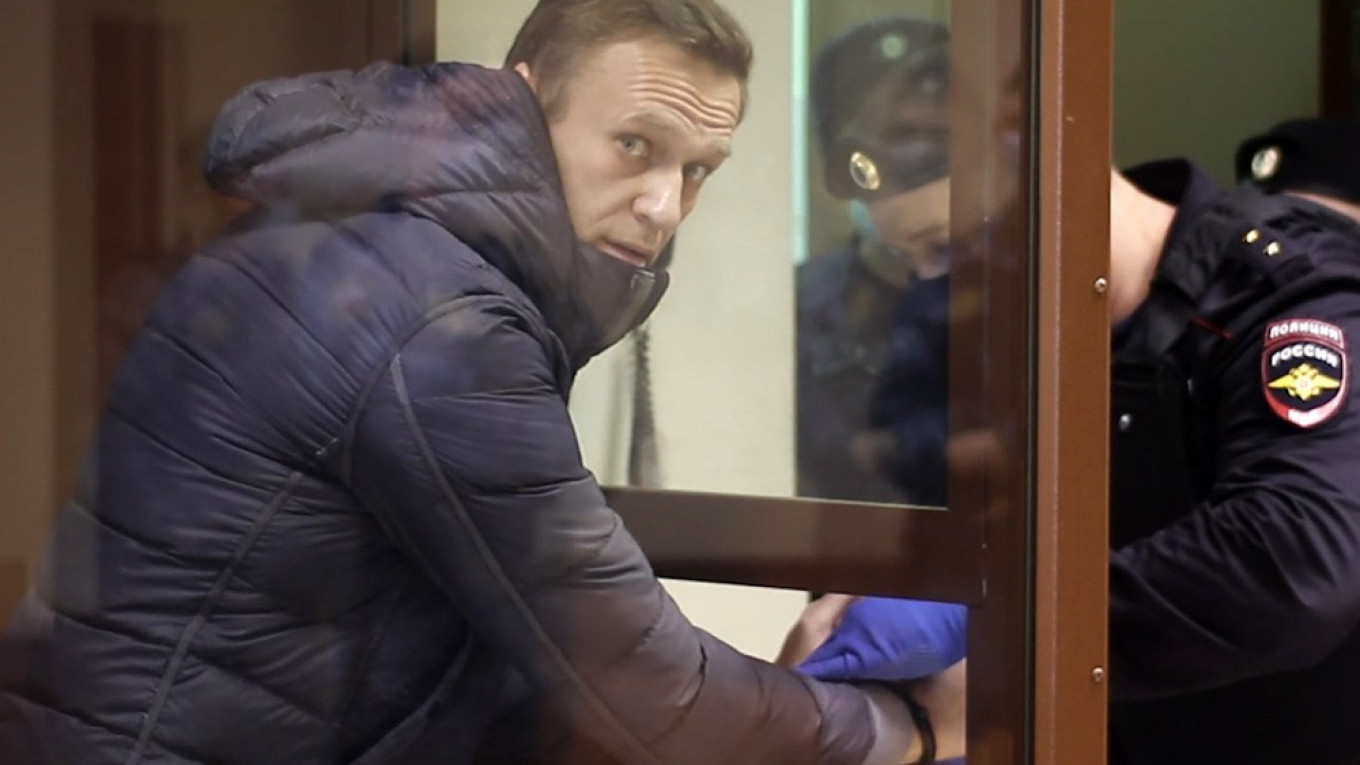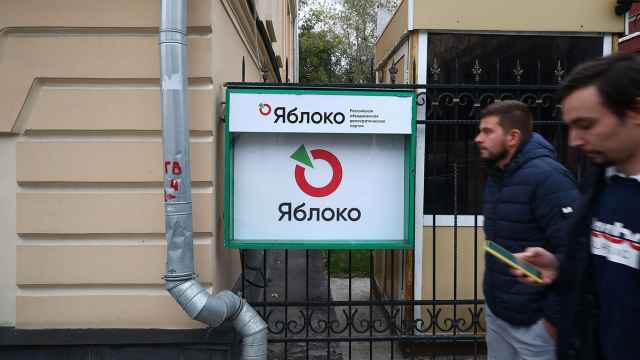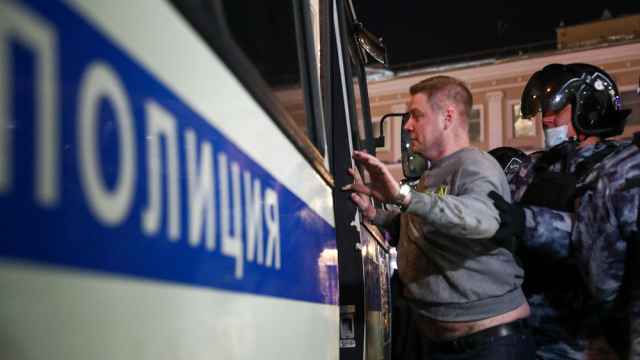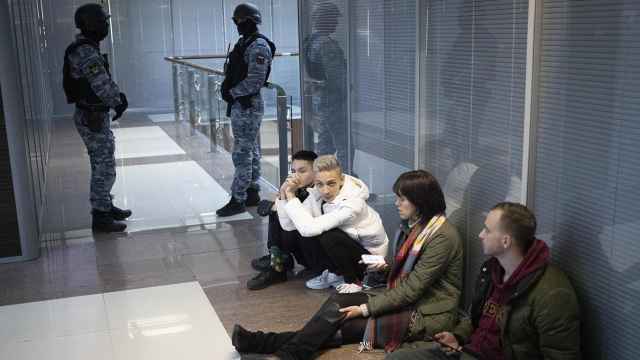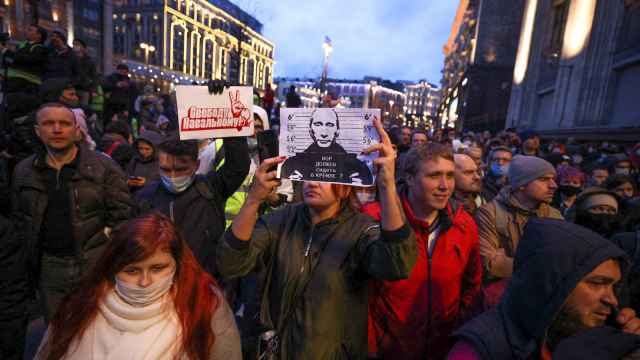A Russian court on Monday postponed the first hearing in the "extremism" case against the political network of jailed Kremlin critic Alexei Navalny, part of a campaign to outlaw the opposition to President Vladimir Putin.
As the hearing got underway behind closed doors, the prosecution submitted additional documents and the proceedings were postponed until June 9, according to lawyers representing Navalny's network.
The case is part of a sweeping crackdown on Putin's most prominent critic and his supporters after Navalny barely survived a poisoning with the Novichok nerve agent last summer.
As part of the effort — which comes a few months before parliamentary elections — the lower house is set on Tuesday to begin debating a bill banning members of "extremist" organizations from being elected lawmakers.
Navalny's network is being represented by lawyers of Team 29, a St. Petersburg-based group that specializes in freedom of speech and treason cases.
The lawyers said it was not clear why Monday's hearing was held behind closed doors.
The Kommersant business daily on Monday cited a source saying the secrecy was because some of the case files contained personal information of police involved in dispersing opposition protests.
But key Navalny ally Ivan Zhdanov said on Twitter that the case materials were kept secret so that "nobody could see the absurdity of what was happening."
'Opposition will be crushed'
Prosecutors in April requested that Navalny's regional network and his Anti-Corruption Foundation be designated "extremist" organizations, accusing them of plotting to stage a Western-backed uprising in Russia.
Such a court ruling would put Navalny and his supporters and financial backers on par with members of the Islamic State group and Al-Qaeda and threaten them with long prison sentences.
"The opposition will be crushed," Abbas Gallyamov, an independent political analyst and former Kremlin speechwriter, told AFP, warning that the official ban on dissent would eventually backfire.
"By destroying the opposition, they are destroying their own legitimacy," Gallyamov said, referring to Russian authorities.
Navalny emerged as a top leader of Russia's opposition movement a decade ago, leading huge anti-Kremlin rallies sparked by claims of electoral fraud in 2011.
Established in 2011, the Anti-Corruption Foundation has published numerous investigations into the lavish lifestyles of Russia's elite.
Even though Navalny was not allowed to run against Putin in a presidential election in 2018, authorities had for years tolerated his political movement, which relies on donations from supporters.
But analysts say the Kremlin is willing to take no chances ahead of parliamentary elections in September as public fatigue is growing with Putin's two-decade rule and the coronavirus pandemic exacerbates economic woes.
'Sliding into darkness'
"Our country is sliding into darkness," Navalny said in a recent post on his Instagram account, which is being run by aides while he serves two-and-a-half years in a penal colony.
"But those who are pushing the country backwards are historically doomed."
Ahead of Monday's court hearing, Russia's financial monitoring service Rosfinmonitoring added Navalny's political network to its database of terrorist and extremist organizations.
Navalny's network had disbanded ahead of the listing to shield its members and supporters from possible prosecution.
Russian lawmakers also proposed legislation that would apply retroactively and ban Navalny's allies from running in parliamentary elections for several years.
The legislation can affect not only senior members and activists of Navalny's political network but tens of thousands of Russians who supported its work with donations.
Navalny was arrested in January upon returning from Germany after recovering from a poisoning attack he says was orchestrated by the Kremlin. The Kremlin denies the allegation.
He is serving two-and-a-half years on embezzlement charges in a penal colony about 100 kilometers (62 miles) east of Moscow.
Islamic State and Al-Qaeda are terrorist organizations banned in Russia.
A Message from The Moscow Times:
Dear readers,
We are facing unprecedented challenges. Russia's Prosecutor General's Office has designated The Moscow Times as an "undesirable" organization, criminalizing our work and putting our staff at risk of prosecution. This follows our earlier unjust labeling as a "foreign agent."
These actions are direct attempts to silence independent journalism in Russia. The authorities claim our work "discredits the decisions of the Russian leadership." We see things differently: we strive to provide accurate, unbiased reporting on Russia.
We, the journalists of The Moscow Times, refuse to be silenced. But to continue our work, we need your help.
Your support, no matter how small, makes a world of difference. If you can, please support us monthly starting from just $2. It's quick to set up, and every contribution makes a significant impact.
By supporting The Moscow Times, you're defending open, independent journalism in the face of repression. Thank you for standing with us.
Remind me later.


